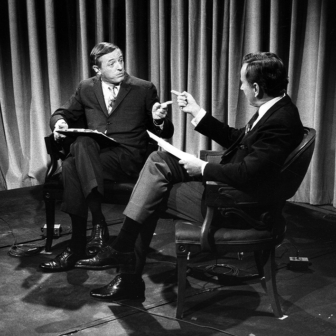How to Speak Money
By John Lanchester | Faber | $29.99
Money, according to the “classical dichotomy” of economics, is a veil. Behind it, the real business of economic life goes on more or less unaffected by the flow of mere banknotes. Double the amount of money in an economy, and prices – which, after all, are just arbitrary bits of Indo-Arabic printed on labels in the supermarket – will simply double as well, and no one is any better off for the exercise. “There cannot,” as J.S. Mill put it in his Principles, “be intrinsically a more insignificant thing, in the economy of society, than money.”
But the notion that money is often irrelevant to economics is sometimes difficult to sell to non-economists. Try it out on your least favourite aunt this Easter. “Nonsense,” she will tell you irritably and quite understandably, “that’s exactly what economics is about. It’s the study of money!” Nonetheless, there are hundreds of economic models that exclude the stuff entirely.
Economists are often interested in monetary phenomena, of course: in the short run, and sometimes in the long, money can matter quite a lot. But in many economic situations, you might think of money as nothing more than the medium in which everything else is expressed, of little interest in and of itself: a pane of glass in a window, rather than the view beyond.
A bit like language, you might go on to think. After all, a shovel is exactly the same thing as une pelle or eine Schaufel: the actual sounds and penstrokes that distinguish the English word from the French or German aren’t of much intrinsic interest themselves. They’re just an easy convention that transforms the picture of a garden implement that’s in my head into roughly the same image in yours – just as, when you stand at the counter in Bunnings, a fifty dollar note might transform a shovel that belongs to the shareholders of a home utility store into a shovel that belongs to you.
But in times of financial crisis brought on by fraud and deception, money and words lose their right to the presumption of neutrality. Money and the language we use to describe its operations have become important of themselves, and the sometimes-forbidding dialect spoken by financial pedagogues, central bankers and pyramid schemers ought to be translated for the use of an average citizen. These, at least, are the underlying philosophy and the guiding motivation, respectively, of John Lanchester’s witty lexicon, How to Speak Money. “Imagine if plumbing became a national problem,” Lanchester invites us, “then, although we could all remember happier times when we didn’t have to speak plumbing, we would now have a reason to learn.”
A novelist, Lanchester became interested in financial diction through a desire to write “a big fat novel about London.” As the world toppled into recession, and one squalid pyramid scheme after another was exposed to the light, he discovered that the horrors that a writer can invent always pale in comparison to reality, as Balzac has one of his characters say. (You can’t help but think that Lanchester might have taken inspiration from that other novelist with a fascination for the darker side of the pecuniary arts.) Lanchester began to write pieces for the London Review of Books as a way of making sense of it all, firstly to himself and then to his readers. How to Speak Money is in some ways a compendium of everything he learnt along the way.
The book is actually three short ones: for the price of entry we get an introductory essay on “the language of money,” then the dictionary itself, and finally an afterword that touches a little more on questions of politics and economic ideology. The first and third portions are charming if a little too heavy on the polemic at times; the dictionary is witty and may be sampled, on and off, at the reader’s pleasure.
There, we are treated to intelligible and sometimes acerbic definitions of technical terms used in finance, the kind that will help you make sense of the business reports at the end of the nightly news. What is a “no-recourse loan”? Lanchester has the answer. What is a synthetic instrument, and how does it differ from a non-synthetic one? With Syriza now in power, how might the possible departure of Greece from the eurozone (or Grexit, see page 144) be affected by legal interpretations of the principle of lex monetae (page 166)? Our author can assist with an explanation, written in the kind of prose that usually manages to appear knowledgeable without coming across as smug, and entertaining and informal without sounding arch. His lexicographical coverage is broad but idiosyncratic: for example, we get both margin in the sense of profit margins and margin call but not marginal, which is something quite different and possibly the most ubiquitous word in economics.
Economics is not usually thought of as a promising repository of metaphor, but Lanchester is especially good at showing how pervasive it is. Metaphor exists not only in financial words that retain the original sense of the comparison, as with, say, bond, but also in words that have dropped anchor quite a distance from their original place of linguistic departure. As Lanchester shows, words like “securitisation” have come to mean something like the opposite of what their metaphoric garb might suggest, a process for which Lanchester has given us the useful neologism “reversification.”
In theory, there is nothing sinister about reversification, of course. Through sarcasm, understatement or hyperbole, words change their meanings all the time. But there are at least two good reasons why you might think it dangerous among twenty-first-century financiers.
The first is that when words change in meaning, the world of finance becomes increasingly less intelligible to anyone outside the clerisy who has been trained in its language. This is not necessarily because the financiers want to be obscure: as Lanchester puts it, “the language of money is complicated because the underlying realities are complicated.” A trade-off has to be made between universal intelligibility and precision of meaning. But there are real social consequences. If the only people who know what a “vanilla mezzanine RMBS synthetic CDO” is are the people who trade them (don’t worry, Lanchester explains it quite well), then people who take a more sceptical attitude towards the notion that commerce in exotic financial instruments is necessary for human prosperity may very well not get the chance to join the discussion at all.
The other potential problem with reversification and other phenomena in economic language is a little more subtle. Sometimes numbers-people tend to use words that resemble normal English ones, but whose meanings are slightly different from their common significations. Consider the phrase “statistically significant.” If I tell you that “there has been no statistically significant warming of the atmosphere in the past fifteen years,” you are liable to think that I have made a particularly strong positive statement about a climatological phenomenon. The adverb “statistically” is partly to blame: it gives off a sort of feeling of scientific rigour that is scarcely supported by the useful but utterly ad hoc notion denoted by the adjective it qualifies.
Far from pronouncing definitely on the state of the world, “no statistically significant warming” is a Scottish verdict, a “not proven” rather than a “not guilty”: a recognition, in other words, that we don’t have enough information to say either way, usually because the period under study is too short. But the delusion-mongers who try to convince you that climate change is a fraud don’t tend to tell you that. You have to rely on your inferences from the plain English meaning of the words, which don’t make for a very good guide at all.
In cases like these, reversification – consider Lanchester’s example of “Chinese wall,” a phrase that could easily have soothed unsuspecting investors unaware that it no longer meant what it once had – can have disastrous intellectual consequences. For anyone who thinks that civilian oversight of the economy is essential, as it is for the military, reversification ought to be worrying, and Lanchester does us a service in defining and exposing it.
Whether by temperament or merely by Stockholm syndrome, Lanchester is usually scrupulously fair to money-people. That said, he misses a trick here and there, describing as “magnificent,” for example, the “the dismal science” tag given to economics by Thomas Carlyle. When he minted that phrase, the grumpy old protofascist was actually regretting the tendency of economists to insist that market forces and individual choice govern the labour market in the West Indies, in marked contrast to Carlyle’s preferred method, which of course was slavery. Economists have more often than is commonly supposed been on the side of the angels.
All autodidacts tend to make the occasional false inference about the meaning of a word or unconsciously fill in the gaps in their knowledge with misapprehensions. (Your correspondent’s German has been the subject of universal criticism on this point.) As such, Lanchester is at times something of an unreliable interpreter and instructor. Deadweight loss, for example, is defined as the “costs that are the indirect consequences of tax”; in fact, deadweight losses are incurred as a result of any deviation from a socially efficient equilibrium, as with monopolies and unregulated carbon emissions. The G20 is not only “for finance ministers and central bankers”: since the global financial crisis, it has been notable for its Leaders’ Summits, a development for which you can to some extent thank Kevin Rudd. Nor is it uniquely focused “on the operation of the financial system.” Milton Friedman was not a proponent of the notion of “rational expectations,” which in any case is not really “the idea that people’s actions, when parsed correctly, can almost always be found to have an economically rational foundation.”
Lanchester is most liable to error when, as with his entry on Friedman, he abandons explanation for condemnation. Pithy characterisation is liable to degenerate into caricature, and caricature dissolves easily into confusion. After all, a true dissection requires a thorough acquaintance with anatomy. Lanchester’s waffly definition of “neoliberal economics” is so expansive that it might plausibly describe everything from the boring old mixed capitalism of Attlee and Chifley to John Galt’s speech in Atlas Shrugged. To be fair, the inexactness of the word “neoliberal” is not Lanchester’s alone, but the deficiency seems more problematic in a lexicon than it might have elsewhere.
“Disagreements in economics aren’t just about technicalities,” Lanchester points out, “they’re usually based on profound divergences in moral analysis.” He’s quite correct. Address your inquiries on this point to Adam Smith, whose chair at Glasgow University was in moral philosophy. But in his attack on “neoliberalism” (incidentally, Lanchester can’t seem to decide whether Smith was a subscriber or not) our author neglects to outline the moral or ethical basis of this ideological disposition he doesn’t like. Merely stating that neoliberalism is “the system which has been dominant in the English-speaking world” isn’t really sufficient; nor is the assertion that neoliberalism emphasises “the role and importance of the individual” or that “the individual is paramount as a moral entity.”
Is this the Mandevillean transmutation of private vices into public virtues? Or is it pure Benthamite utilitarianism: adding up individual pleasure and subtracting individual pain in a sort of moral arithmetic? Can the case for latter-day capitalism instead be made by appealing to the tradition of Aristotelian virtue ethics, as Deirdre McCloskey has done in her book Bourgeois Virtues? Lanchester doesn’t specify.
These flaws, though, are not fatal: they debase slightly the authorial currency – the value of which has been established by what is obviously long and serious reading on Lanchester’s part – but not to the point of hyperinflation (page 151). The strength of the book is its democratic temper and Lanchester’s obvious affection for and talent with the English language. The exposure of linguistic reversification in finance is a real public service and the phrase itself a useful coinage. Like a foreigner who has been living for a time in a land that is not his own, Lanchester is not entirely fluent in his second tongue, and he is not an infallible critic of the native population, but he is a charming and generous guide to tourists, for whom his book would be well worth the capital outlay. •




